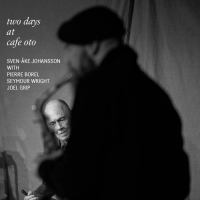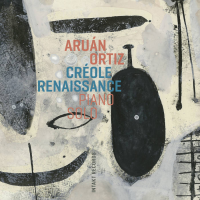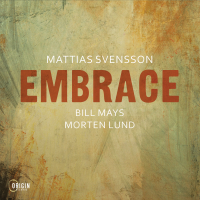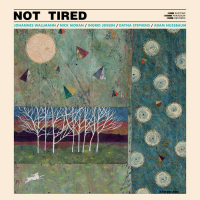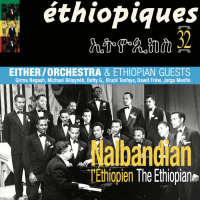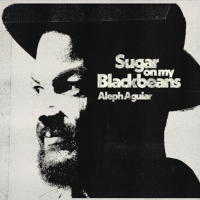Home » Jazz Articles » Album Review » Sven Åke-Johansson: Two Days at Cafe OTO
Sven Åke-Johansson: Two Days at Cafe OTO
Two Days at Cafe Oto is invaluable as a posthumous peek into the drummer's mischievous genius, and never disappoints. He is joined by saxophonist Seymour Wright and bassist Joel Grip, both members of the trailblazing group Ahmed, and Pierre Borel, one of Europe's most idiosyncratic reedmen. The ensemble is a hard one to imagine as a single unit; all from rather diverse backgrounds, with Borel making a name for himself as an accomplished soloist. Johansson appears to delight in these inherent contradictions. He plays the instigating prankster with the oversized bag of tricks. Easy pathways are decisively rejected, dragging the band through equally profound and hilarious sonic waters.
"Day One" begins sans Borel, and thus the flavor of Grip and Wright's Ahmed work comes through strong. Grip is especially thorny, baritone and boisterous, while Wright's alto lays down a heavy bed of sound. Johansson acts accordingly and disrupts their stint with an off- kilter march syncopated under long, loud rolls. Wright appears to fully take in his elder's designs, and begins a campaign of truly wild squawks and pops. A sort of cat-and-mouse develops between the two. Wright occupies the subtle silences between Johansson and Grip, and like a snake in a thin crevice, glides his way into various shapes and styles among the drum's heady atmospheres. All are admirably light on their feet, yet what strikes the ear most is Johansson's immortal humor. He plays with us as much as his bandmates. At once, the audience hears exotic war drums and opening salvos, then the steady, swooning bop of Paul Motian's Bill Evans Trio work.
Once Borel chimes in, Johansson has already introduced an entirely other element. His accordion has graced other recordings before, but none as prominently as this one. Grip and Borel introduce an otherworldly barrage of rapid-fire sirens and ominous bumps while the accordion flurries in strange, childlike rhythms. One can imagine Johansson as some lunatic organ grinder who stumbled drunkenly on the stage, while the official band tries to play around this boisterous interruption before welcoming him to the fold with open arms. As the group continues, bizarre forms are repurposed from the first section's wanderings. Like a display of troubadours battling for the attention and coffers of the carnival, all actors begin their finest and most pleasurable bleats and moans atop Grip and Johansson's metropolitan flurry. What results is uncomfortable, antagonistic, and, by the end, inexplicably moving, like some great drama, the subject of which they can only guess.
"Day Two" is somewhat of a different animal. For the first half, Wright takes a step back, leaving Borel to fill in the blanks. His horn is more verbose, more swooning than the sounds of his bandmates, leaving room for a more pleasant, even cool trio composition to emerge. Even when the accordion reappears at the halfway mark, the internal contradictions within the ensemble relax, uncovering a show of genuine camaraderie around Johansson's musical chicanery. When Wright returns, he is transformed into an industrial vessel among the distinctly medieval-sounding troupe. He is vivid and matter-of-fact in a sharp staccato. His toots and murmurs are not as efficient as the steam engine in Honegger's triumph—he delights in teetering off the edge of things; the whole band does, they purposefully push themselves to the very limit of disaster, only to "return" to a new normal, and continue the pattern anew.
Johansson's jokes and jibes are infectious, evidenced by how willing his cohorts are to entertain them. But he is, above all, a tenacious and demanding bandleader. He accepts nothing less than an absolute change in every one of his pupils. And by the close of the final night, there is a certain solace and satisfaction in hearing everyone construct their own, to hear their final multitonal panoply unfurl into a delirious, swinging adventure in the record's final minutes brings to mind a heated debate between members of an insane cabal. Wright's full- bodied lashes sear across Borel's fits and stammers, while Grip's slow pizzicato keeps them all walking on hot coals, all while Johansson returns to the maddening march of the first night, gleeful witness to his successors' sandbox antics. It is heartbreaking to let a sound like that go, but if there is any solace to be had in such a loss, it rests in the enduring flame of the maestro's madness; his serpentine tirade against creative stagnation still blazes in his conspirators. Because of him, jazz remains what it always should be: a refuge for children and their immortal dreaming.
Track Listing
Wright, Johannson, Grip; Borel, Wright, Johannson, Grip; Borel, Wright, Johannson, Grip; Borel, Johannson, Grip; Borel, Wright, Johannson, Grip.
Personnel
Sven-Åke Johansson
drumsPierre Borel
saxophone, altoSeymour Wright
saxophone, altoJoel Grip
bass, acousticAdditional Instrumentation
Sven-Åke Johansson, accordion
Album information
Title: Two Days at Cafe OTO | Year Released: 2025 | Record Label: Otoroku
Tags
PREVIOUS / NEXT
Support All About Jazz
 All About Jazz has been a pillar of jazz since 1995, championing it as an art form and, more importantly, supporting the musicians who make it. Our enduring commitment has made "AAJ" one of the most culturally important websites of its kind, read by hundreds of thousands of fans, musicians and industry figures every month.
All About Jazz has been a pillar of jazz since 1995, championing it as an art form and, more importantly, supporting the musicians who make it. Our enduring commitment has made "AAJ" one of the most culturally important websites of its kind, read by hundreds of thousands of fans, musicians and industry figures every month.


